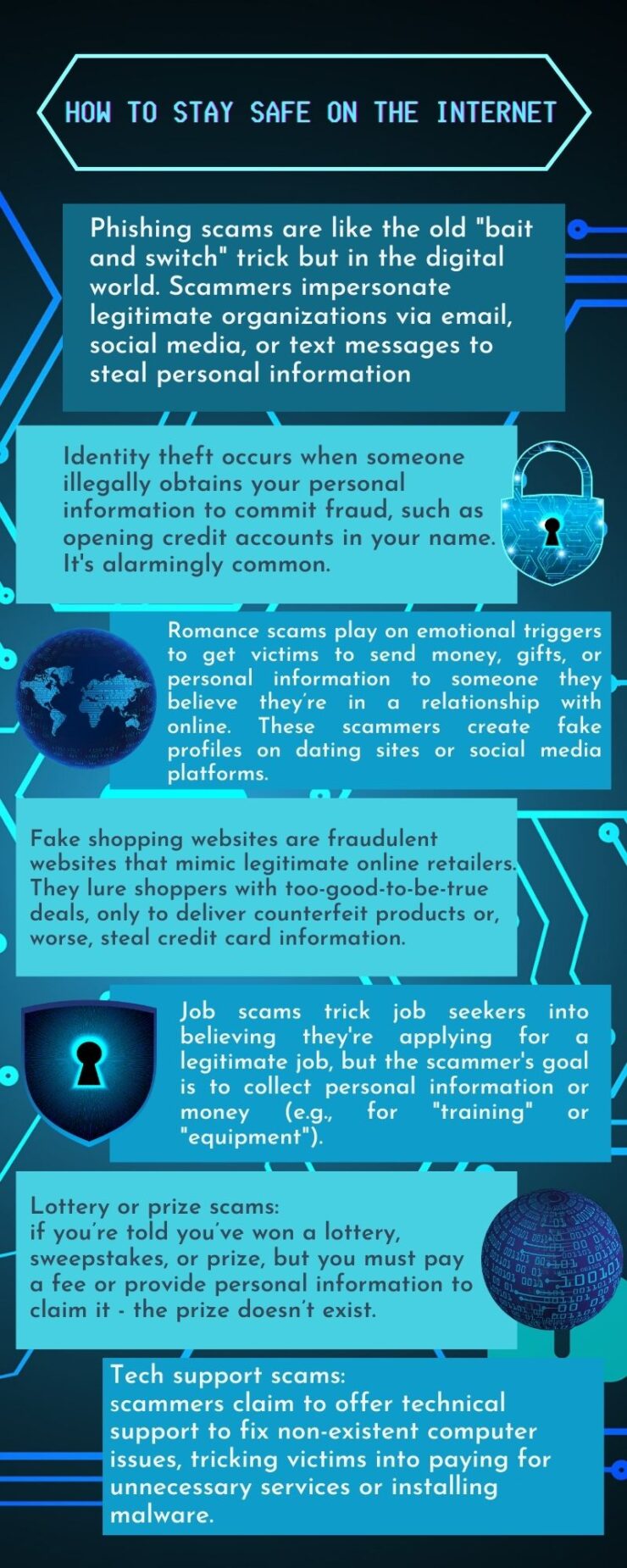The internet is an invaluable resource for learning, entertainment, and staying connected, but it’s also a playground for scammers looking to take advantage of the unwary. The elderly are particularly vulnerable to scammers and frequently become their victims when they surf the internet.
That’s why we’re going to look into some of the most common scams and explain how to avoid them.
If you’re new to the internet and want to know how to stay safe and protected, here is a summed-up PDF where you can find all the important information ⇨ A Guide to Avoiding Internet Scams for the Elderly
What type of scams are there and how to avoid them?
Phishing scams
They are like the old “bait and switch” trick but in the digital world. Scammers impersonate legitimate organizations via email, social media, or text messages to steal personal information or infect your device with malware. The FBI’s Internet Crime Complaint Center reported that people lost $57 million to phishing schemes in one year alone.
The most common victims? Surprisingly, it’s not just the tech-unsavvy—many young and educated internet users get caught too.
How to avoid phishing scams?
- Verify the sender: If an email or message seems suspicious, check the sender’s email address or contact the company directly through their official website.
- Think before you click: Avoid clicking on links or downloading attachments from unknown sources.
- Use security software: Ensure your devices have up-to-date antivirus software that can detect and block phishing attempts.
- Educate yourself: Familiarize yourself with the latest phishing techniques and remain cautious about sharing personal information online.
Identity theft
It occurs when someone illegally obtains your personal information to commit fraud, such as opening credit accounts in your name. It’s alarmingly common – according to the Javelin Strategy and Research every two seconds another American becomes a victim of identity fraud, with millions of cases reported annually.
Victims often spend months, if not years, recovering from the financial and emotional damage.
How to avoid identity theft?
- Secure your personal information: Shred sensitive documents and secure your personal records.
- Be privacy-savvy online: Use strong, unique passwords for different accounts and enable multi-factor authentication wherever possible.
- Monitor your accounts: Regularly check your bank statements and credit reports for any unauthorized transactions or accounts.
- Stay informed: Keep abreast of the latest security breaches and take proactive steps if you suspect your information has been compromised.
Romance scams
Romance scams play on emotional triggers to get victims to send money, gifts, or personal information to someone they believe they’re in a relationship with online. These scammers create fake profiles on dating sites or social media platforms, building trust over time. The emotional toll on victims is often devastating.
How to Avoid Romance Scams?
- Perform a background check: Use search engines and social media to verify the person’s identity.
- Never send money or share financial details: No matter how convincing the story, this is a red flag for a scam.
- Talk to friends and family: They can offer perspective and may identify warning signs you missed.
- Report suspicious behavior: If you suspect a scam, report it to the dating site or social media platform and consider filing a complaint with law enforcement.
Fake shopping websites
These are fraudulent websites that mimic legitimate online retailers. They lure shoppers with too-good-to-be-true deals, only to deliver counterfeit products or, worse, steal credit card information. During the pandemic, there was a spike in fake online shops as more people turned to online shopping.
The Better Business Bureau Online Scams Report highlighted that online shopping fraud cost victims $380 million in just one year, with 36% of online retail fraud originating from fake websites.
How to avoid fake shopping websites?
- Check the website’s authenticity: Look for HTTPS in the URL and a padlock icon. Also, read reviews and check for a physical address and contact information.
- Use secure payment methods: Credit cards often offer better fraud protection than other payment options.
- Keep your software updated: This can help protect you from security vulnerabilities that scammers exploit.
- Trust your instincts: If a deal seems too good to be true, it probably is.
Job scams
These scams trick job seekers into believing they’re applying for a legitimate job, but the scammer’s goal is to collect personal information or money (e.g., for “training” or “equipment”). In an increasingly remote world, these scams have proliferated, targeting those desperate for work.
How to avoid job scams?
- Research the company: Look it up online, check reviews, and verify its contact information.
- Never pay for a job: Legitimate employers will never ask you to pay for the promise of a job.
- Be wary of unsolicited job offers: Especially if they offer a high salary for minimal work.
- Check the email address: Often, scammers use email addresses that mimic legitimate companies but with slight variations.
Lottery or prize scams
Long story short: if you’re told you’ve won a lottery, sweepstakes, or prize, but you must pay a fee or provide personal information to claim it – the prize doesn’t exist.
How to avoid lottery or prize scams?
- If you didn’t enter, you didn’t win: Legitimate lotteries or sweepstakes don’t require winners to pay to receive their prize.
- Be smart: Ignore requests for payment or personal information in exchange for a prize.
- Check it all up: Verify the legitimacy of any competition directly with the organizing entity.
Tech support scams
Scammers claim to offer technical support to fix non-existent computer issues, tricking victims into paying for unnecessary services or installing malware.
How to avoid tech support scams?
- Be informed: Know that legitimate companies don’t contact you for unsolicited tech support.
- Protect your computer: Never grant remote access to your computer to someone who contacts you unexpectedly.
- Contact company directly: Hang up on unsolicited calls from “tech support” and contact the company directly through official channels if you have concerns.
Fake charity scams
Scammers set up fake charities, often in the wake of natural disasters or crises, to steal well-meaning people’s donations.
How to avoid fake charity scams?
- Donate to established charities: Verify the charity’s authenticity through official charity regulator websites.
- Be cautious with crowdfunding requests: donate to people you know directly or through verified platforms.
- Ignore unsolicited donation requests via email or social media.
Travel scams
Scammers offers for free or discounted vacations that may have hidden costs, be non-existent, or are significantly different from advertised.
How to avoid travel scams?
- Book through reputable travel agencies or direct providers.
- Read the fine print on offers and look for hidden fees.
- Check reviews and ratings from multiple sources before booking.
Investment scams
These scams promise high returns for low risk but are often vehicles for fraudsters to take your money. Cryptocurrency scams are a rapidly growing subset.
How to avoid investment scams?
- Research before investing: Check reviews, and regulatory body websites, and seek independent advice.
- Be wary of unsolicited offers and pressure to invest quickly.
- Understand what you’re investing in: If it’s too complex or secretive, it’s a red flag.
The story of Marjorie Bloom losing her entire savings due to an internet scam
77-year-old Marjorie Bloom’s peaceful retirement turned upside down when she lost $661,000 to a tech scam, thinking she was safeguarding her life savings. Fooled by a faux “fraud investigator” from her trusted bank, PNC, she transferred her entire nest egg into cryptocurrency, under the guise of protecting it from non-existent thieves. This scam wasn’t just about money; it exploited trust and played on fear, leading Marjorie to make a series of hasty, secretive decisions without consulting her family, including her daughter who works for CNBC.
The sad truth is, tech scams are on the rise, especially targeting older adults who may not be as tech-savvy. In Marjorie’s case, the promise of security led to a significant financial loss, drastically altering her retirement plans and ability to travel, one of her passions. Despite the setback, Marjorie fought back, suing PNC Bank for failing to spot the scam, eventually settling out of court.
Marjorie’s ordeal is a stark reminder for all of us to remain vigilant online, question things that seem too good to be true, and always discuss significant financial moves with trusted loved ones. In the digital age, scammers are lurking, ready to exploit any vulnerability.
Many seniors have hobbies that include surfing on the net, so you should either change your hobbies or take precautions to stay safe.
FAQs
I am a retired internal medicine physician named Dr. William Tousignant. With over three decades of experience in the field of geriatric care, I specialized in diagnosing and managing health issues among senior patients throughout my career.
Related Posts:
- Becoming an Allergy Specialist in 2024 - Education Guide
- What Is the Easiest RN to BSN? 7 Things You Should…
- Rashes From Pads: Causes, Symptoms, Treatments, How…
- Rash Under Breast: Causes, Symptoms, Treatments, How…
- Sunburned Lips - Blisters, Swollen, Treatment,…
- Itchy Palms: Causes, Symptoms, Remedies, and Treatment





